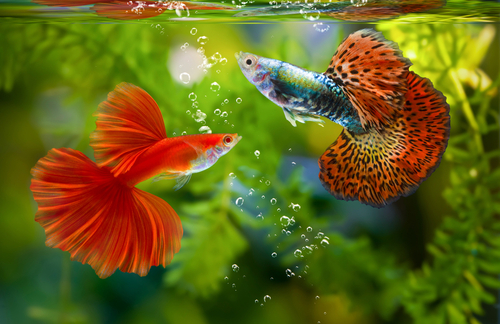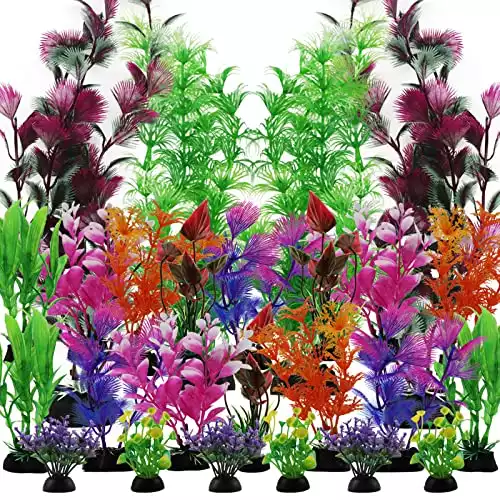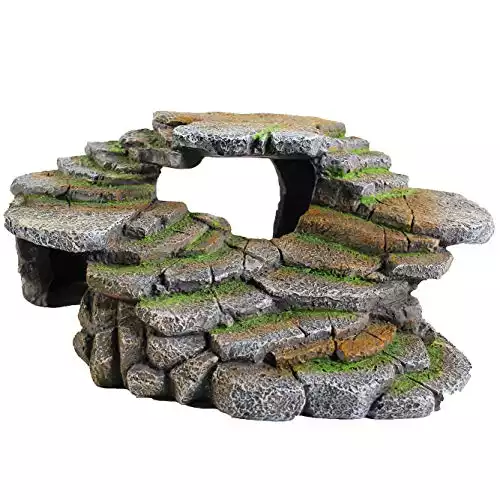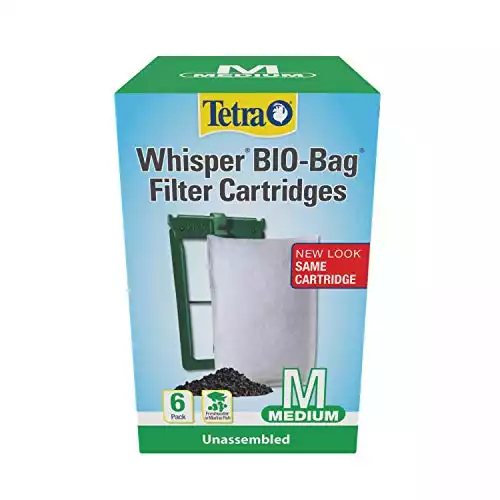Guppies are a fan-favorite fish to keep, either in bigger or smaller aquariums. Their color, peaceful nature and temperament make them an amiable tank mate, however, they do have their own preference for which fish they want to share their aquarium space with.
According to an Aquarium Guide, guppy fish cannot be paired with predatory fish in aquariums despite their community-friendly nature.
This article covers details about the 15 best guppy tank mates with reference to their biological and behavioral needs. Read on ahead to find out everything you must know before finding tank mates for your guppies.
Contents
Guppy Tank Mates – What You Need to Know
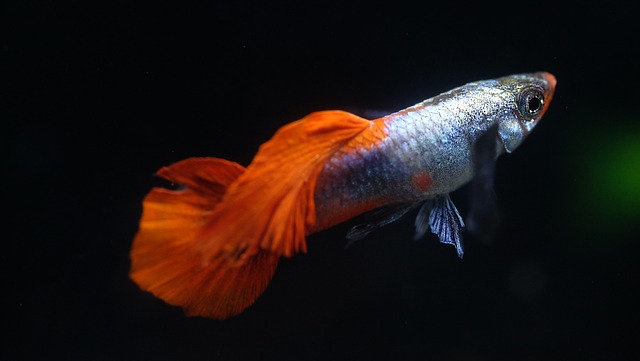
Guppies are a very peaceful fish type which are also very small and colorful, a bright addition to your aquarium. If you’re a beginner aquarist, the task of choosing a tank mate for your guppy fish can be tough.
Before you choose the tank mates for your guppy fish, it’s important to know that the decision rests upon not one, not two, but a myriad of factors.
These factors are to be kept under keen consideration while choosing a tank mate for your guppy fish, not just for the guppies’ sake, but also for their tank mate’s safety. Callousness about these factors will not only ruin your aquarium’s atmosphere but turn it into a warzone.
Here are 4 topics you should learn about thoroughly before diving into the choice of what tank mates to pair your guppy fish with.
Temperament
Guppies are described by specialists as a community-friendly fish. Although they like to remain in larger groups, they are not always found in schools.
So it’s likely they’ll feel comfortable swimming with other varieties of fish easily. Since they’re very small, they are also incredibly fast, and have a mischievous nature; often nipping at the fins of other fish swimming close by.
Size
Guppies vary in size from male to female. While males are typically 0.6-1.4 inches long, females are longer and bigger, being 1.2-2.4 inches long in size.
Since guppies are a relatively smaller fish, they need to be paired up with similar-sized fish as to not feel uncomfortable with their company. This will avoid conflict between the different varieties of fish in your aquarium and save your guppies from being seen as prey by the other fish.
Competition
While guppies are friendly most of the time, they do have a competitive streak in their nature, which may make an appearance whenever a new fish is added to the aquarium. If the new fish is too submissive, it may end up being bullied by the swarm of guppies, so it’s better to add in a group of these new fish to keep them from bullying each other.
Male guppies may often compete with other males for females, so it’s a good idea to add more female tank mates to their environment to avoid competition.
Parameters & Tank Setup
Guppies aren’t very particular about their environment and tank setup and can tolerate a wide range of water parameters, which makes them an ideal tank mate for other fish.
Guppies are okay with a water temperature of 50-84°F, although mid-range is considered optimal. They can also tolerate all levels of pH, although if you want to be specific, 6.8-7.8 would be the best. Water hardness should be from 8-12 dGH, and it’s important to note that guppies can live even in brackish water.
Check out my top recommended aquarium add-ons to replicate your pets’ natural habitat and keep them happy:
|
Primary Rating:
3.5
|
Primary Rating:
3.5
|
Primary Rating:
3.5
|
|
$13.99
|
$18.99
|
$5.28
|
Guppy tank mates
Here are some fish that will prove to be amazing tank mates for your guppies ranked in order, putting the best and most recommended first.
You might also want to read:
1. Suckermouth Catfish
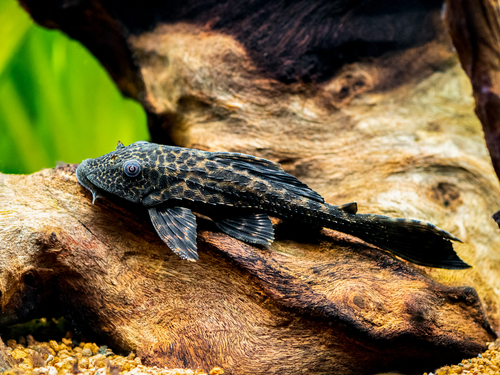
- Scientific Name: Hypostomus plecostomus
- Adult Size: 18 inches
- Compatible with: Smaller guppies
- Water Temperature: between 74° and 80° F
- Minimum tank size: 125 gallons
- Care Level: Easy (Beginner)
- Origin: South America
This is the absolute best fish to put as a tank mate for your guppies as suckermouth catfish are very peaceful in nature and mostly keep to themselves at the bottom side of the tank, leaving no room for conflict or competition. The most common type of this fish will grow quite large for a guppy tank so you may consider looking smaller species such as bristlenose or clown plecos.
Pros of keeping Suckermouth Catfish with guppies
- Peaceful and harmonic environment
- No room for arguments
- Keep the tank clean
Cons of keeping Suckermouth Catfish with guppies
- Suckermouth Catfish may become predatory and attack the guppies
- Some species of the fish get too large and cloud the tank, leaving no room for guppies
2. Cory Catfish
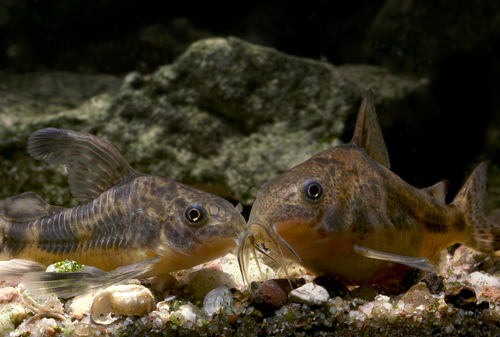
- Scientific Name: Corydoras paleatus
- Adult Size: 1-4 inches
- Compatible with: All guppy fish breeds
- Water Temperature: between 72 and 82°F
- Minimum tank size: 20 gallons
- Care Level: Easy (Beginner)
- Origin: South America
Not only are cory catfish bottom dwellers, but they’re also peaceful and slow swimmers that do not disrupt the peace of the aquarium, making them a compatible tank mate for guppies. They also keep your tank clean from leftover food and algae.
Pros of keeping Cory Catfish with guppies
- Can occupy the tank as a single fish as well as in groups
- Friendly and peaceful nature
- Require less maintenance
Cons of keeping Cory Catfish with guppies
- Water parameters may not match with guppies sometimes if the fish is wild caught
- Need tanks with sand substrate
3. Swordtails
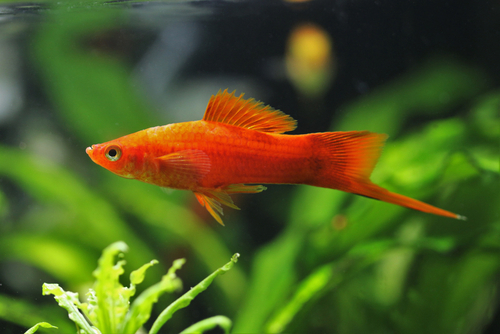
- Scientific Name: Xiphophorus hellerii
- Adult Size: 5.5 inches
- Compatible with: Female guppies
- Water Temperature: between 72-79°F
- Minimum tank size: 15 gallons
- Care Level: Easy (Beginner)
- Origin: North and Central America
We highly recommend swordtails as a companion to guppies because of their peaceful nature and their beautiful outward appearance; not only will they get along well with guppy fish, but they will also make for an excellent addition to your tank.
Pros of keeping Swordtails with guppies
- Are omnivorous like guppies
- Easy to take care of and maintain
- Are efficient breeders
Cons of keeping Swordtails with guppies
- Male swordtails are competitive with male guppies
- Their long tails might irritate the guppies and cause conflict
4. Common Molly
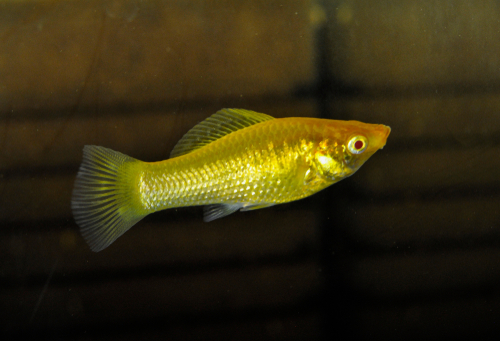
- Scientific Name: Poecilia sphenops
- Adult Size: 4.5 inches
- Compatible with: Female guppies
- Water Temperature: between 75°-80°F
- Minimum tank size: 10 gallons
- Care Level: Easy (Beginner)
- Origin: Mexico
Common mollies are among the top 5 best companions for guppies because of their low maintenance and their peaceful nature. They’re also very small and are very adaptable to any environment or any fish breed they’re around.
Pros of keeping Common Molly with guppies
- Top feeders, non-picky
- Require very little care
- Very similar to guppies in size and nature
- Can survive in both freshwater and saltwater aquariums
Cons of keeping Common Molly with guppies
- Reproduce very quickly, may cause overcrowding of the tank
- Hassle to ensure male and female mollies are kept apart
5. Platy Fish
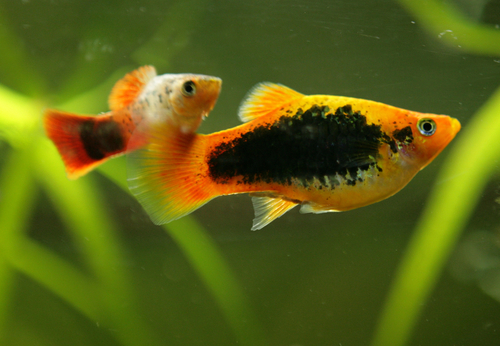
- Scientific Name: Xiphophorus maculatus
- Adult Size: 3 inches
- Compatible with: Fast-swimming guppies
- Water Temperature: between 72°F- 78°F
- Minimum tank size: 15 gallons
- Care Level: Easy (Beginner)
- Origin: Central America
Not only are they good companions for guppies, they’re also a very bright-looking fish that adds more color to your tank. These small fish are very adaptable and can adjust to different environments very easily.
Pros of keeping Platy Fish with guppies
- Belong to the same family as guppies
- Living conditions match the guppies
- Are peaceful and quiet
- Come in colorful varieties – aesthetically pleasing
Cons of keeping Platy Fish with guppies
- Cannot be kept alone – need to be kept in a group for them to be comfortable
- Male platy fish quarrel a lot with one another
- May be intimidated and eaten by the guppies
6. Harlequin Rasbora
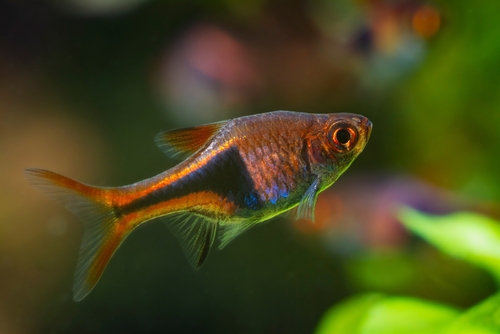
- Scientific Name: Trigonostigma heteromorpha
- Adult Size: 2 inches
- Compatible with: Non-predatory guppies
- Water Temperature: 72 °F to 81 °F
- Minimum tank size: 10 gallons
- Care Level: Easy (Beginner)
- Origin: Southeast Asia
A gentle and small fish with a long life span, harlequin rasbora is a resilient fish that can tolerate extreme conditions while also maintaining a friendly relationship with the rest of its tank mates. This is also why we included it within the top ten fish to be around guppies in a tank.
Pros of keeping Harlequin Rasboras with guppies
- Can adjust to water temperature fluctuations and different tank environments
- Their preferred living conditions are similar to guppies
- No territorial behavior
Cons of keeping Harlequin Rasboras with guppies
- Need to be kept in groups of 6 or more or else they become stressed
- Are at a higher risk of becoming the prey
7. Cardinal Tetra
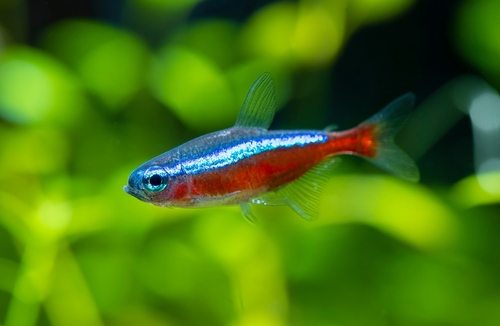
- Scientific Name: Paracheirodon axelrodi
- Adult Size: 1.25 inches
- Compatible with: Less-aggressive guppies
- Water Temperature: 73°F to 81°F
- Minimum tank size: 20 gallons
- Care Level: Easy-medium
- Origin: South America
A bold-colored fish, cardinal tetras require easy to medium-level care. They work well in a modest-sized aquarium and are very friendly to guppies.
Pros of keeping Cardinal Tetra with guppies
- Prefer heavily planted tanks like guppies
- Similar water parameters
- Not picky eaters
Cons of keeping Cardinal Tetra with guppies
- Difficult to breed – need specific water and tank conditions
- Are schooling fish – can only be kept in large groups
- Guppies are sometimes at risk of being eaten by cardinal tetras
8. Bristlenose Pleco
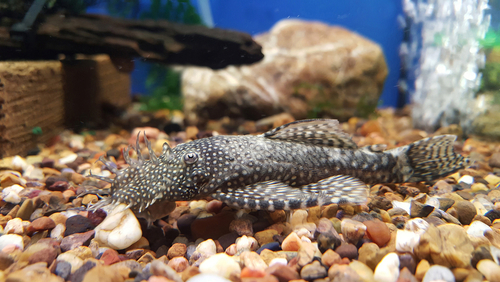
- Scientific Name: Ancistrus cirrhosus
- Adult Size: 4-5 inches
- Compatible with: Fast-swimming guppies
- Water Temperature: between 70-78°F
- Minimum tank size: 15 gallons
- Care Level: Medium (Moderate)
- Origin: Argentina
Being a sucker fish, the bristlenose pleco makes for a great guppy tank mate if you’re an aquarium keeper with a bit more experience. They tend to stay near the bottom and their peaceful temperament will make sure the two fish get along quickly.
Pros of keeping Bristlenose Pleco with guppies
- Easily identifiable because of their appearance
- Bottom dwellers that feed on algae – will keep the tank clean
- Are herbivores so won’t prey on the guppies
Cons of keeping Bristlenose Pleco with guppies
- Don’t play with aggressive guppies
- May need temperature regulation
- Need hiding places to be put in the tank – overcrowding
9. Bronze Corydoras
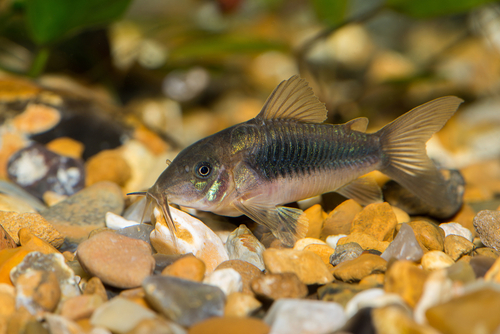
- Scientific Name: Corydoras aeneus
- Adult Size: 2.5 inches
- Compatible with: Slow-swimming guppies
- Water Temperature: between 68 to 82 °F
- Minimum tank size: 10 gallons
- Care Level: Easy (Beginner)
- Origin: South America
A type of fish that can survive in any sort of water and environment, bronze corydoras prove to be good tank mates to guppies where resilience is concerned.
Pros of keeping Bronze Corydoras with guppies
- Small build and attractive exterior
- Low-maintenance and resilient
Cons of keeping Bronze Corydoras with guppies
- They’re very small, so may get eaten by the guppies if not careful
- They need to be fed extensively since they’re bottom dwellers
- Need to keep them in a group
10. Kuhli Loach
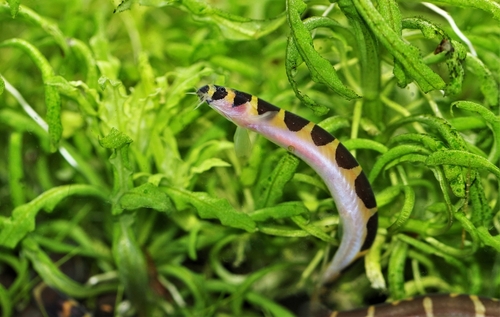
- Scientific Name: Pangio kuhlii
- Adult Size: 4 inches
- Compatible with: All guppy breeds
- Water Temperature: between 75 – 86°F
- Minimum tank size: 30 gallons
- Care Level: Medium (Moderate)
- Origin: Southeast Asia
This nocturnal fish hides during the daytime and scrambles for food at night. They’re shy bottom feeders, thus they’re bound to never bother your guppies.
Pros of keeping Kuhli Loach with guppies
- A very reserved fish
- Are of a similar build as guppies, thus will not take a lot of space in the tank
Cons of keeping Kuhli Loach with guppies
- Need to be kept in groups of 3-5 for comfort
- Are susceptible to catching diseases if the water level is not up to the mark
- They’re notorious for jumping out of the tank – inconvenient maintenance
11. Female Betta
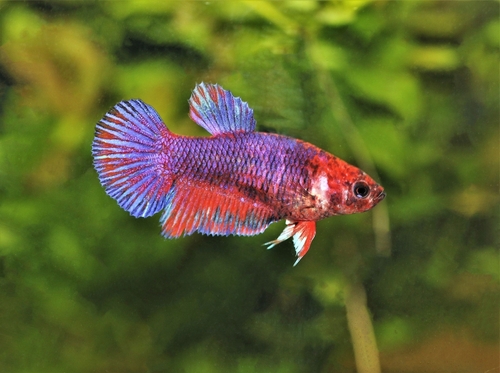
- Scientific Name: Betta Splendens
- Adult Size: 2.25 inches
- Compatible with: All guppies
- Water Temperature: between 75 – 80°F
- Minimum tank size: 5 gallons
- Care Level: Medium (Moderate)
- Origin: Mekong Delta
Female bettas are a better option compared to male bettas as companions to guppies because of their less aggressive temperament and calm yet curious nature.
Pros of keeping Female Betta with guppies
- Seek the same calm tank environment
- A similar preference for habitat
- Can be kept singularly or in a group
Cons of keeping Female Betta with guppies
- Can be a bossy tank mate for guppies
- Are very fast and may clash with guppies while swimming
- Require a lot of the keeper’s attention
12. White Cloud Mountain Minnow
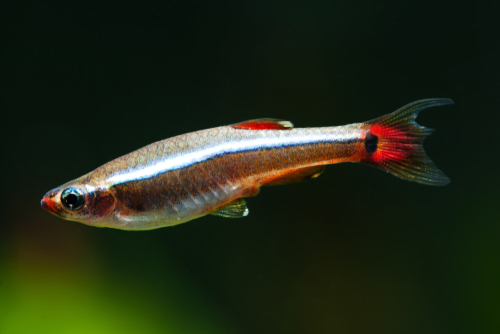
- Scientific Name: Tanichthys albonubes
- Adult Size: 1.5 inches
- Compatible with: Fancier guppy breeds
- Water Temperature: 57-71°F
- Minimum tank size: 10 gallons
- Care Level: Easy (Beginner)
- Origin: China
A group-centered fish, white cloud mountain minnow is a colorful fish with an incredibly small stature that likes living in a colder temperature environment. They make for an adequate guppy companion and thus are considered a good choice.
Pros of keeping White Cloud Mountain Minnow with guppies
- Since they’re small, they can be kept in groups within the tank without overcrowding
- Good for beginner keepers, as they’re low maintenance
Cons of keeping White Cloud Mountain Minnow with guppies
- Might get intimidated by the bigger guppies because of their small size, risk of being bullied or eaten by the guppies
13. Nerite Snails
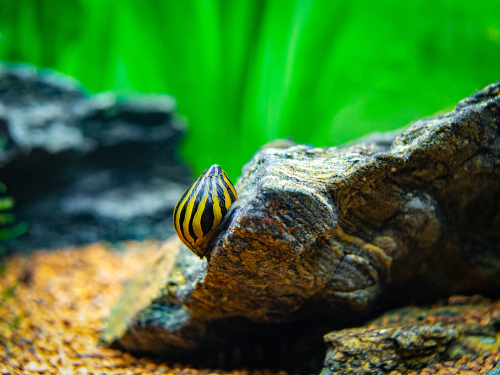
- Scientific Name: Neritina natalensis
- Adult Size: 1 inch
- Compatible with: Gentle guppies
- Water Temperature: between 72°-78°F
- Minimum tank size: 10 gallons
- Care Level: Easy (Beginner)
- Origin: Africa
This freshwater snail type is a popular choice as a companion for guppy fish, as it mostly keeps to itself and loiters around the walls of the tank, rarely ever bothering the guppies.
Pros of keeping Nerite Snails with guppies
- Low-cost and low-maintenance
- Good match for guppy fish
- Keeps algae under check for your tank
Cons of keeping Nerite Snails with guppies
- Need saltwater to breed
- Need a balanced pH level in order to survive
14. Otocinclus Catfish
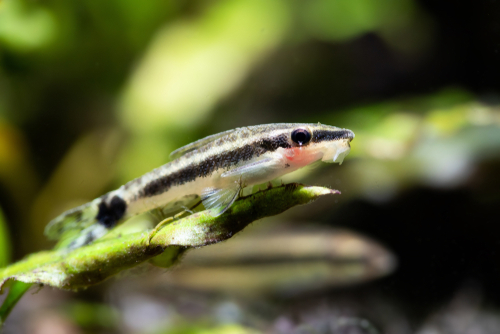
- Scientific Name: Otocinclus sp.
- Adult Size: 2 inches
- Compatible with: Non-aggressive guppies
- Water Temperature: between 72-82°F
- Minimum tank size: 20 gallons
- Care Level: Medium (Moderate)
- Origin: South America
Otocinclus are one of the best algae eaters for small tanks. This fish will survive well in the company of guppies as they’re very community-friendly.
Pros of keeping Otocinclus Catfish with guppies
- Voracious eaters of algae – keep the aquarium clean
- Are very active and fast – good playmates
Cons of keeping Otocinclus Catfish with guppies
- Need diet supplements
- They’re fragile and don’t do well in bad water conditions
15. Amano Shrimp
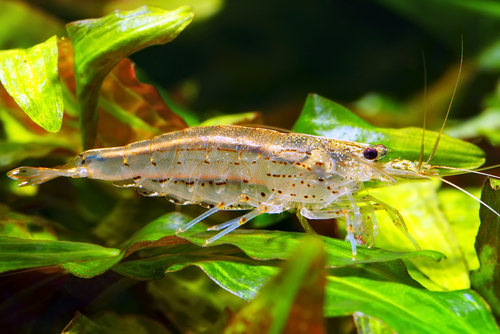
- Scientific Name: Caridina multidentata
- Adult Size: 2 inches
- Compatible with: calm guppies
- Water Temperature: 64°-80° F
- Minimum tank size: 20 gallons
- Care Level: Hard (Advanced)
- Origin: East Asia
This mischievous species would fare well with guppies which are calmer and less prone to aggression in nature since it seems like the Amano shrimp likes to play pranks on its tank mates.
Pros of keeping Amano Shrimp with guppies
- Will be a colorful addition to the tank
- Peaceful bottom-dwellers
Cons of keeping Amano Shrimp with guppies
- Have the habit of stealing food from their tank mates
- Require extra dietary care
- Hide really well, to the point where owners may have difficulty locating them
Outro
There are many species of fish, shrimp, and snails that are compatible tank mates to guppy fish. Although it may be hard sometimes to get their living conditions and temperaments right, this list provides you with 15 best guppy tank mate options to choose from the next time you are confused as to which fish would prove to be a good companion for your guppy.
Frequently Asked Questions
What is a good tank mate for guppies?
All of the aforementioned like Cory Catfish, Swordtails, Common Mollies are excellent tank mates for guppies. Platies are also a good choice as they are a peaceful species of fish.
Which species of fish are bad guppy tank mates?
Some species have an aggressive response towards species like guppy fish, thus you should avoid placing them within the same tank. These species include; Angelfish, Cichlids, Endler’s Livebearers, and other large fish which may end up putting your guppy at risk.
Do fishes end up crossbreeding if I place one with my guppy?
Yes, some of the breeds of fish may end up crossbreeding with your guppies, although not many would prefer to. To avoid this, you can place males and females of the same species together in the tank.
Keep your tank lively, healthy and fun with these top recommended products:
|
Primary Rating:
3.5
|
Primary Rating:
3.5
|
Primary Rating:
3.5
|
|
$13.99
|
$18.99
|
$5.28
|

Ian Sterling, founder of Fishlab.com, began his aquarium journey over 30 years ago, driven by a deep fascination for fish and their diverse personalities. His website, Fishlab.com, is dedicated to making fishkeeping accessible and enjoyable, offering beginner-friendly guidance, expert insights, and a community for aquarists to connect and share experiences.


